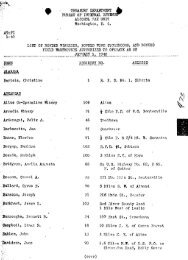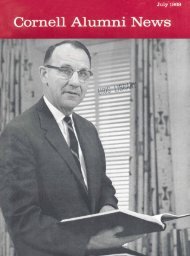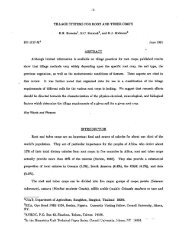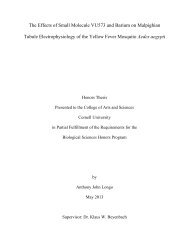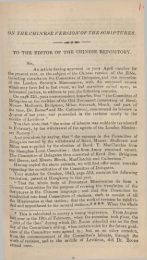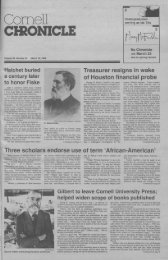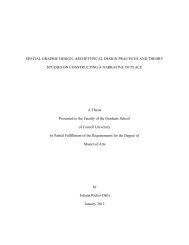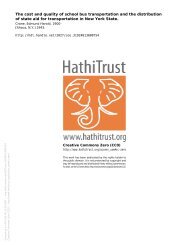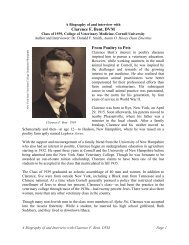1/1 - eCommons@Cornell - Cornell University
1/1 - eCommons@Cornell - Cornell University
1/1 - eCommons@Cornell - Cornell University
- No tags were found...
You also want an ePaper? Increase the reach of your titles
YUMPU automatically turns print PDFs into web optimized ePapers that Google loves.
chymosin, made through a recombinant<br />
process, as an example of a<br />
product that had obvious benefits.<br />
Approved by the FDA in 1990 with<br />
little fanfare and no apparent protest,<br />
it is used in cheese-making as the<br />
first step in milk coagulation. Recombinant<br />
chymosin is a copy of the active<br />
ingredient in rennin, a natural<br />
substance that can be found only in<br />
the fourth stomachs of calves. Making<br />
it recombinantly eliminated the<br />
need to extract it from the natural<br />
source.<br />
In her own work, Jelinski is examining<br />
the properties of spider silk<br />
produced by 30 golden orb weavers,<br />
which spin "gorgeous golden webs"<br />
of extraordinarily strong material.<br />
But "it takes forever to collect silk,"<br />
she says. Biotechnology could solve<br />
this problem by cloning the gene for<br />
the silk protein, inserting it into fastgrowing<br />
microbes or into plants and<br />
producing enough to replace high<br />
tensile materials made from petrochemical<br />
products. Says Jelinksi:<br />
"This would have a tremendous positive<br />
benefit for the environment."<br />
One area that she finds<br />
particularly promising is<br />
genetic probing to test<br />
for dangerous organisms<br />
that contaminate foods,<br />
such as the recent outbreak of a<br />
deadly strain of E. colt. (Although<br />
normally found in the small intestine<br />
of most mammals, the presence of<br />
E. colt is a sign of contamination. In<br />
bioengineering, however, E. coli is a<br />
workhorse because of its ability to<br />
reproduce quickly.) Food science<br />
Prof. Carl Batt is developing a probe<br />
that can pinpoint the dangerous organism<br />
in food. Batt also has developed<br />
DNA probes to detect the<br />
herpes virus in cows.<br />
In other work at <strong>Cornell</strong>, geneticists<br />
are looking for ways to insert<br />
foreign genes into apple trees to confer<br />
resistance to diseases such as fire<br />
blight or to improve shelf life.<br />
But the Union of Concerned Scientists'<br />
Rissler wonders if such<br />
projects are just more of the same—<br />
conventional farming technologies<br />
coming from people who designed an<br />
agricultural system that has led to<br />
erosion, pesticide-resistant super<br />
insects and pollution. "Biotechnology<br />
is bringing us magic bullet solutions<br />
and they're being brought to<br />
us by the same people who brought<br />
us pesticides as a magic bullet—<br />
Monsanto, Ciba-Geigy, DuPont,"<br />
she says. "These are the folks who<br />
are saying now, This is the answer<br />
to problems in agriculture/ hoping<br />
that we'll forget that they once<br />
brought us the pesticides that we are<br />
now trying to reduce."<br />
"We are not opposed to the technology,"<br />
explains Rissler. "But we<br />
are skeptical about the benefits and<br />
worried about the risks." The Union<br />
of Concerned Scientists has three<br />
goals concerning biotechnology—to<br />
ensure that biotech products are<br />
regulated and used safely, to get<br />
people to look at alternatives to biotechnology<br />
and to make sure the<br />
public is involved in the debate.<br />
Rissler says she would also like to<br />
see public tax dollars diverted from<br />
biotechnology and put into sustainable<br />
agriculture, a system that emphasizes<br />
crop rotation and other<br />
practices.<br />
Recognizing the need for open<br />
debate among different factions,<br />
Boyce Thompson's Hardy in 1988<br />
organized the National Agricultural<br />
Biotechnology Council, a consortium<br />
of about 20 not-for-profit institutes<br />
on both sides of the biotechnology<br />
issue. "It was established as an open<br />
forum where all points of view could<br />
be brought together to address what<br />
were perceived to be key issues,"<br />
he says.<br />
Rissler acknowledges that<br />
biotech companies and scientists<br />
take a dim view of her opinions. Plant<br />
pathology Prof. Zaitlin, for example,<br />
believes that the UCS has put up<br />
"unreasonable barriers, not backed<br />
up in facts."<br />
Rissler maintains that open debate<br />
is essential. "I think it's healthy<br />
to have this discussion on biotechnology,"<br />
she says. "Even though<br />
people feel threatened by it, I think<br />
it's healthy. I think, ultimately, even<br />
the industry folks will look back and<br />
be grateful." a<br />
Mara Bovsun is managing editor of<br />
Biotechnology Newswatch.<br />
JUNE 1994<br />
27<br />
SUPPORT<br />
OUR<br />
ADVERTISERS<br />
THEY<br />
SUPPORT<br />
<strong>Cornell</strong><br />
Magazine<br />
When you respond to an<br />
800 number, mention the Ivy<br />
League® Magazine Network<br />
when asked where you saw the ad.



